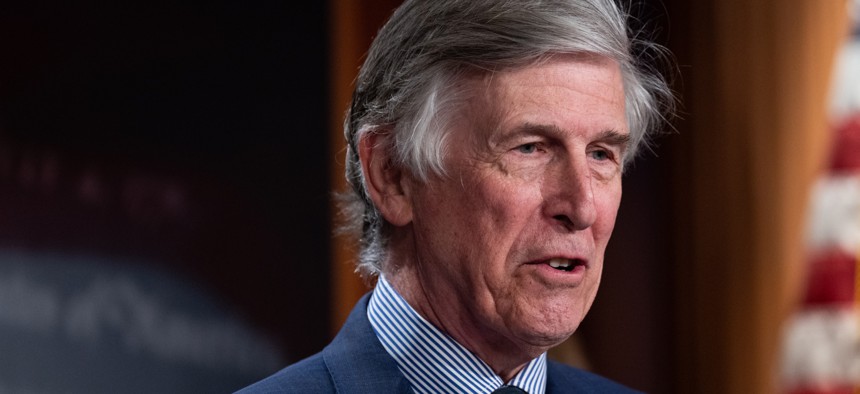
Rep. Don Beyer, D-Va., helped cosponsor an amendment in the fiscal 2024 NDAA to make veterans entering the federal civilian workforce immediately eligible for paid parental leave. Bill Clark / Getty Images
Expanded leave access for veteran feds makes it into defense policy bill
Under a provision of the fiscal 2024 National Defense Authorization Act, federal agencies would be required to incorporate veterans’ military service when determining eligibility for paid leave.
2023 has been a relatively quiet year for the annual defense policy bill.
Aside from the kerfuffle over a short-term extension of a federal warrantless surveillance program, few measures not directly related to the defense apparatus have made it into the fiscal 2024 National Defense Authorization Act. As an ostensibly “must-pass” bill that Congress manages to pass more frequently than it does annual appropriations bills, the measure has become a Christmas tree upon which lawmakers hang bills that otherwise may not see the House or Senate floor for a vote.
House lawmakers earlier this year said they were aiming to avoid that dynamic this year, though Republicans still included a number of conservative policy riders. Most of those provisions have been stripped from a compromise draft of the bill on which the Senate began debate this week, although one measure has lawmakers of both parties celebrating: an amendment expanding paid leave access for veterans who have transitioned from active duty military to a position in the civilian federal workforce.
Currently, in order to gain access to 12 weeks of paid parental leave—a benefit itself adopted via the 2020 NDAA—or paid leave under the Family and Medical Leave Act, a federal employee must have 12 months of service. But the law establishing those requirements lists only federal agencies, the U.S. Postal Service, Postal Regulatory Commission or an entity operating via a nonappropriated fund.
The amendment, sponsored by Reps. Don Beyer, D-Va., Chrissy Houlahan, D-Pa., Don Bacon, R-Neb., Nancy Mace, R-S.C., and Chris Smith, R-N.J., would add “honorable active service” in one of the military service branches to the list. That means service members who transition directly from the military to civilian federal employment would be able to access paid parental leave or FMLA leave immediately, provided they have completed at least a year of military service.
The measure also requires the Veterans Affairs Department to implement similar changes for its Title 38 medical professionals, whose workforce policies are governed by a different federal law than most other federal workers.
“Every American worker deserves access to family and medical leave, and the provision we secured in the NDAA will recognize time in military service like time in the federal civil service,” Beyer said in a statement. “Passage of this measure will be a big win for my constituents, many of whom are federal workers. But federal employees work across the United States, and a huge number of them served their country in uniform, so the benefit of this much-needed change to law will be felt all over the country.”
“Providing family medical leave benefits to federal employees is one of Congress’ more significant legislative accomplishments over the past several years,” Bacon said. “I’m grateful for the opportunity to work with Congressman Beyer supporting veterans who choose to enter the federal workforce by crediting their past military service toward their family and medical leave eligibility requirements.”
Houlahan said the provision will plug a hole created as a result of Congress approving paid parental leave for civilian federal workers and military service members piecemeal over a three-year period.
“I can’t underscore enough how far federal paid family leave has come in the past few years,” Houlahan said. “In [fiscal 2020], I secured 12 weeks of paid parental leave for federal workers; in [fiscal 2023], I also secured 12 weeks for our service members. But even as we saw historic progress, a gap remained for our service members transitioning to a job in the federal government. By crediting time in uniform towards paid parental leave for the federal government, we will help retain the best and brightest America has to offer.”







